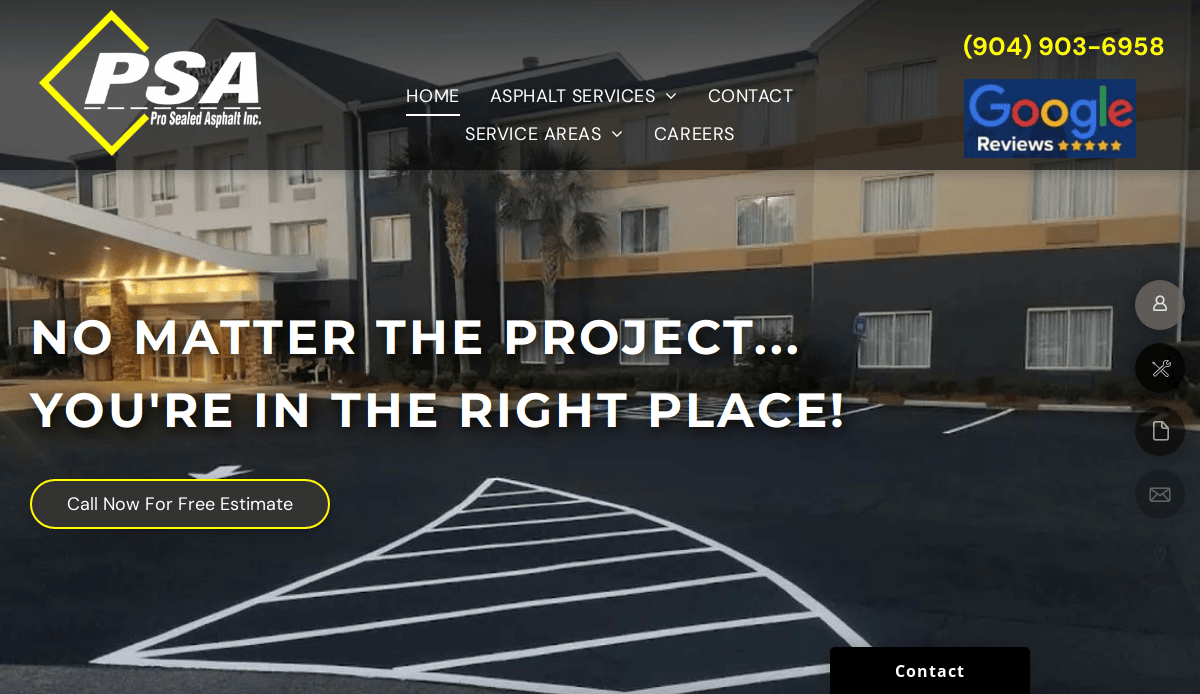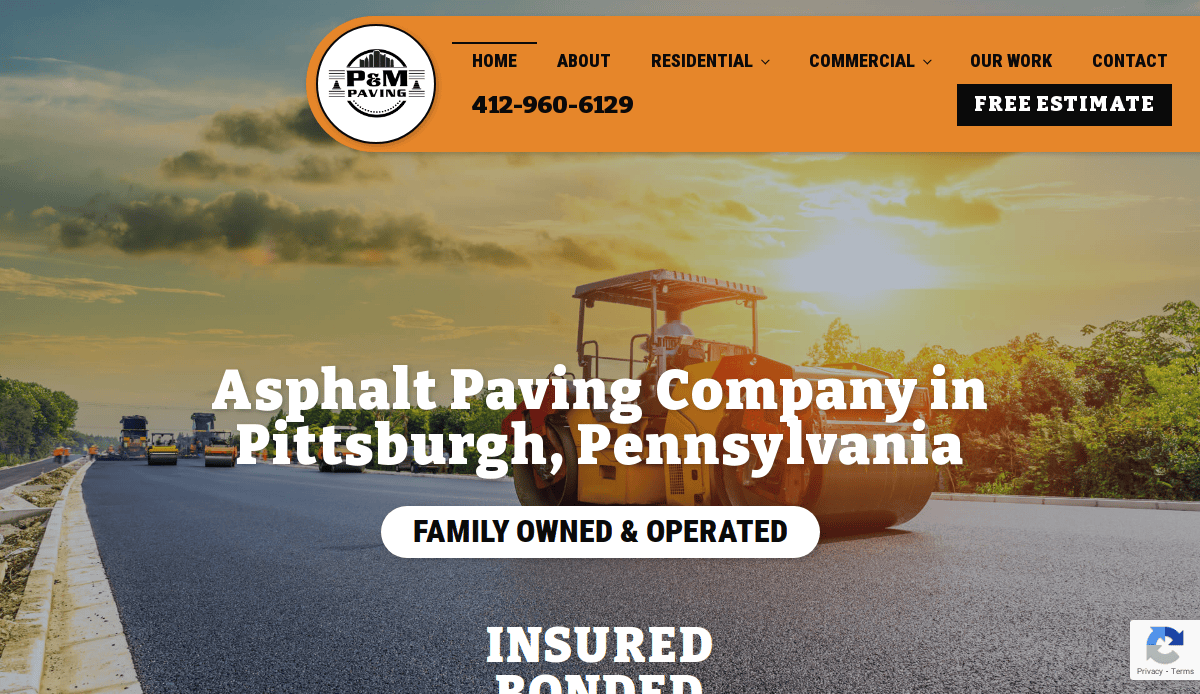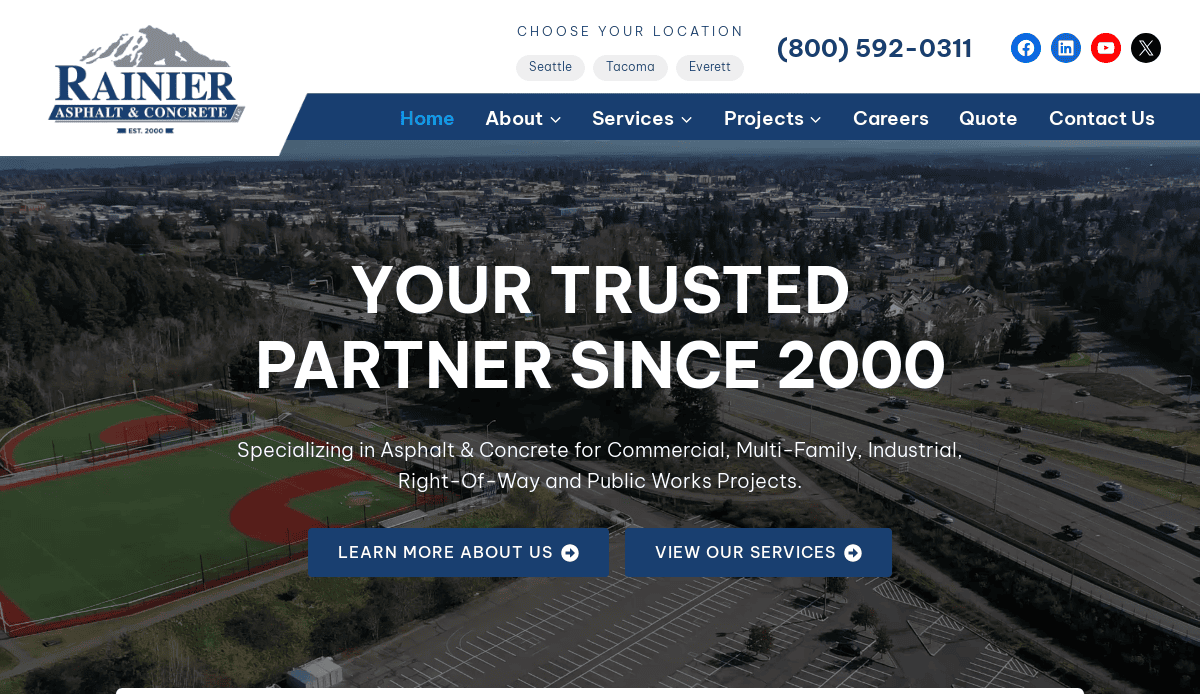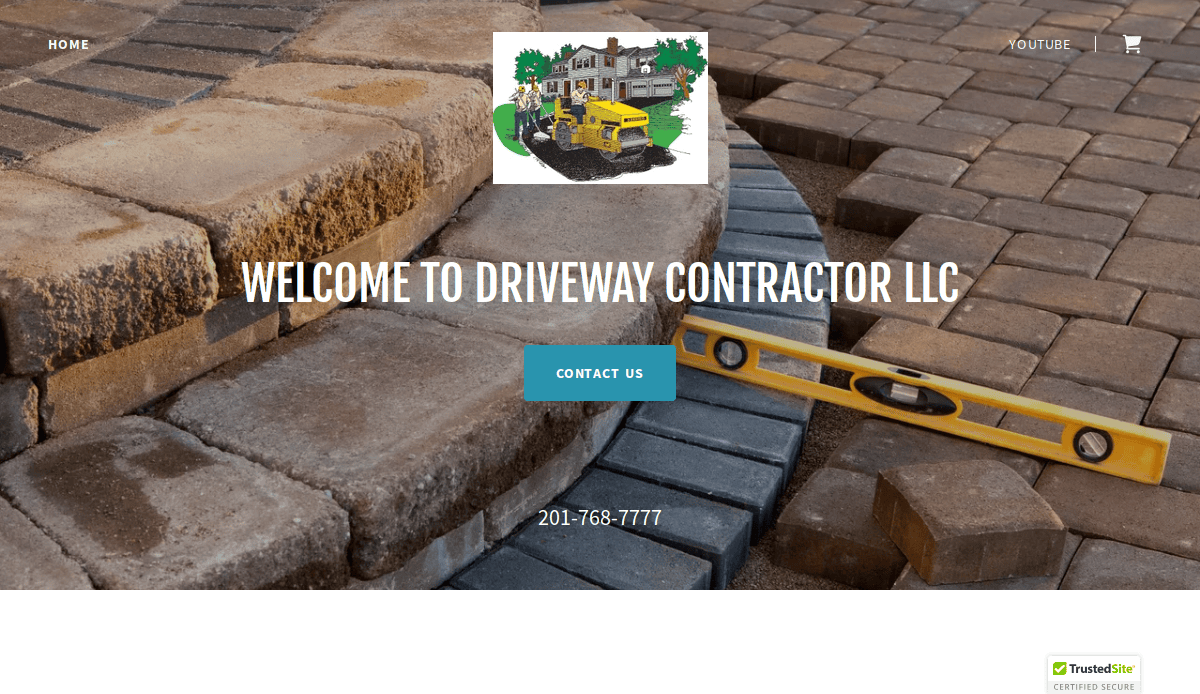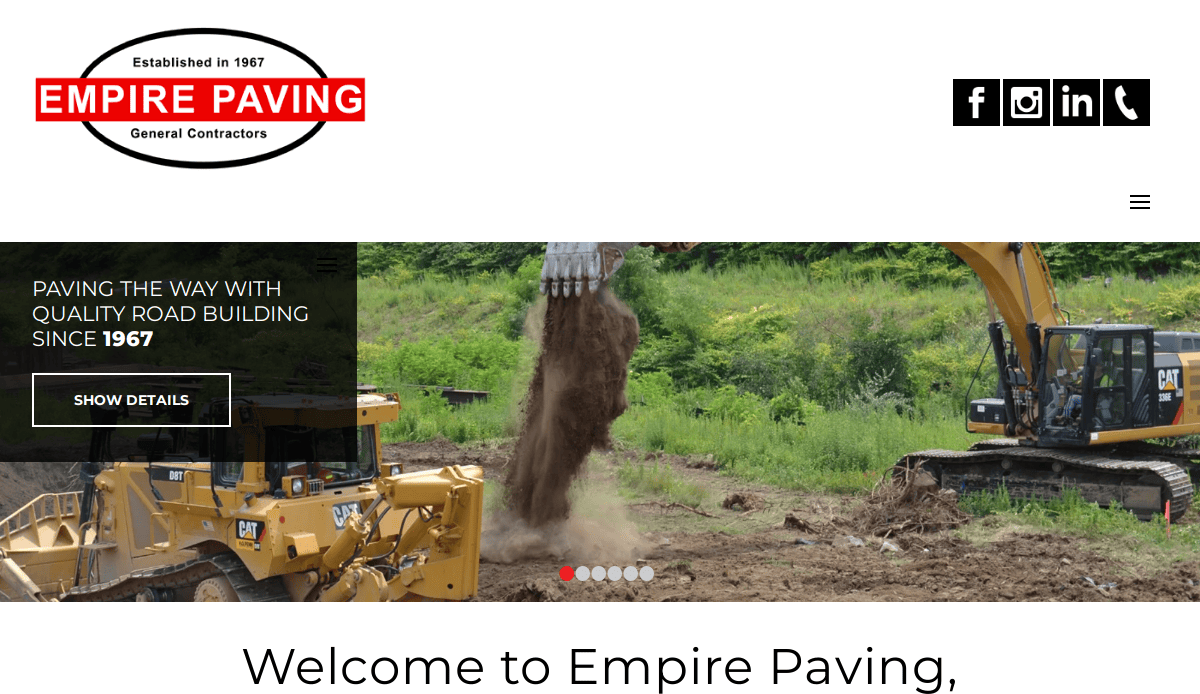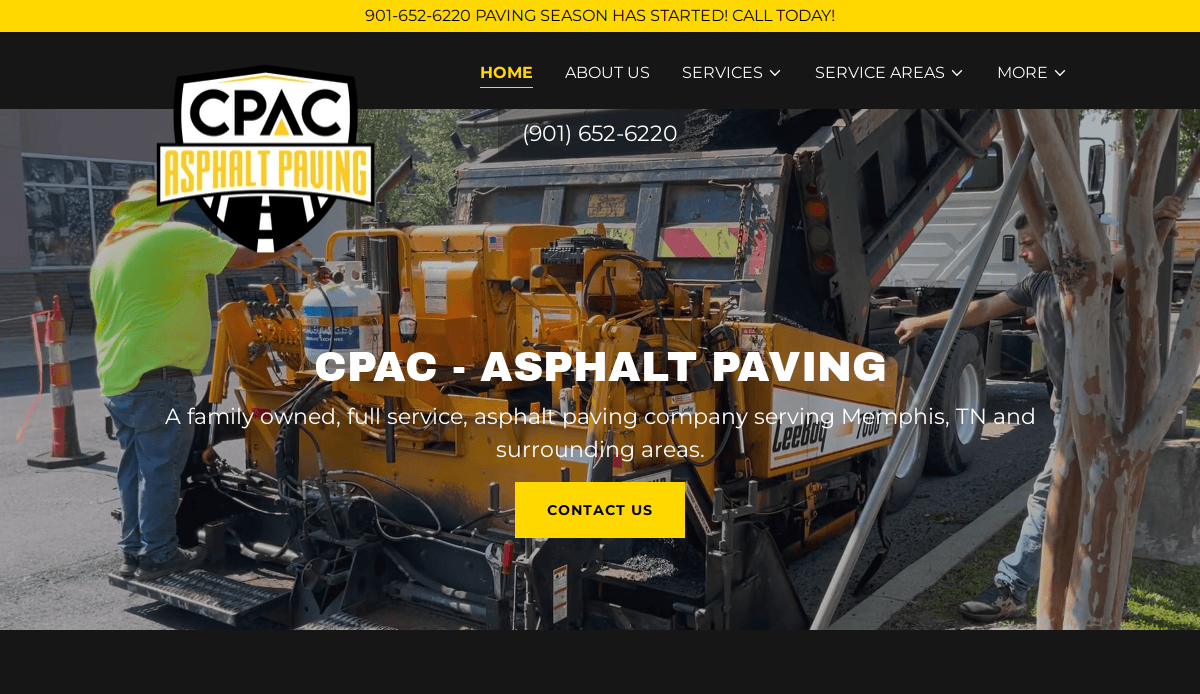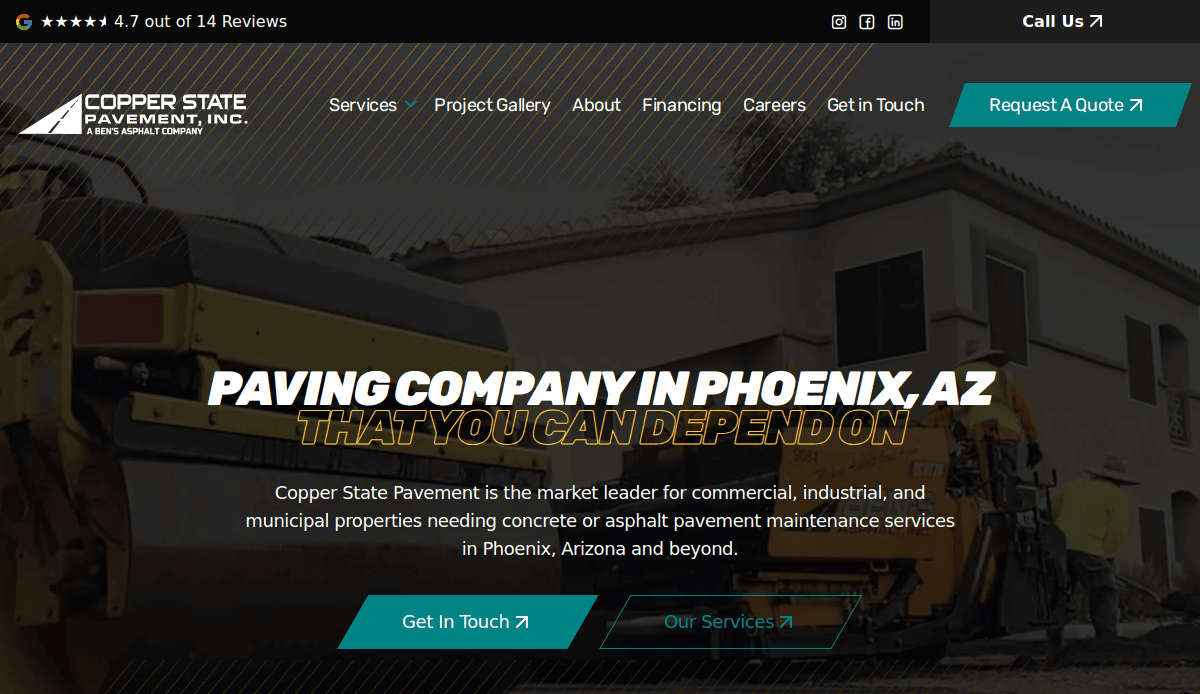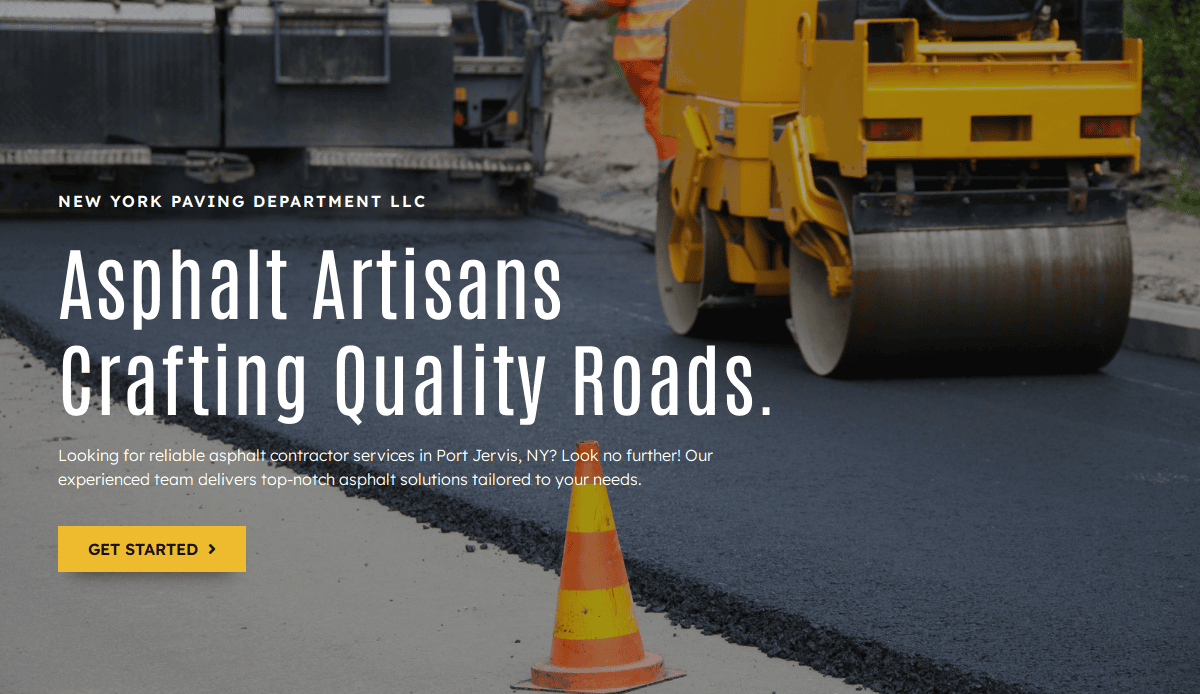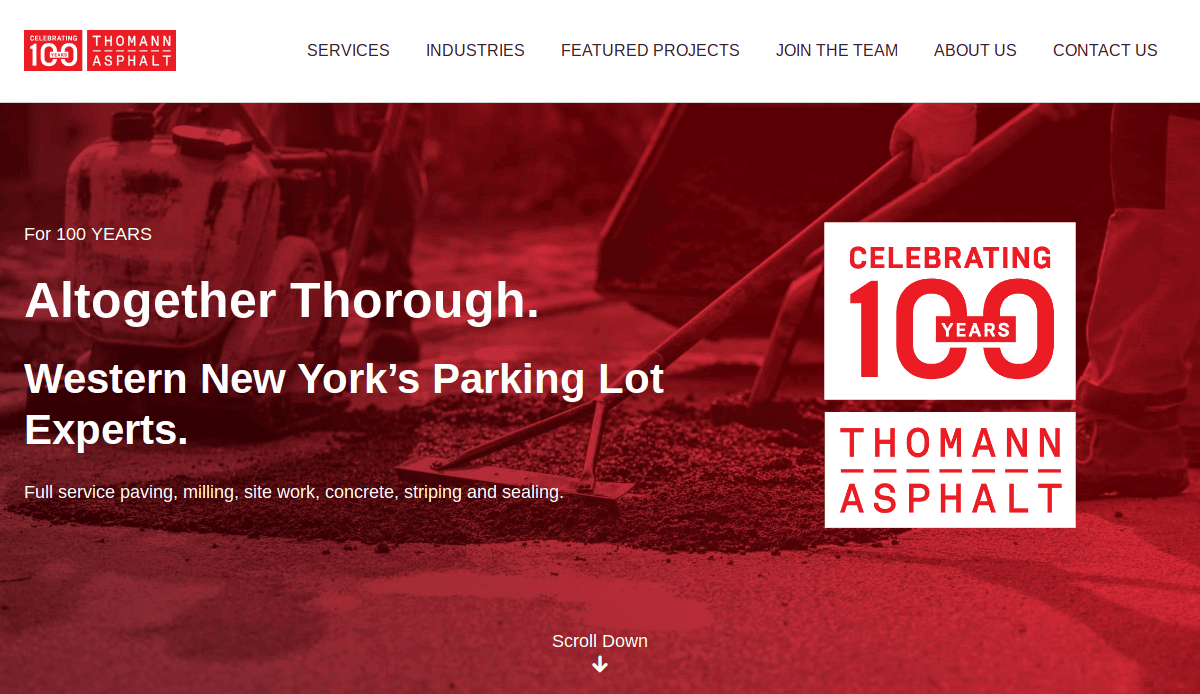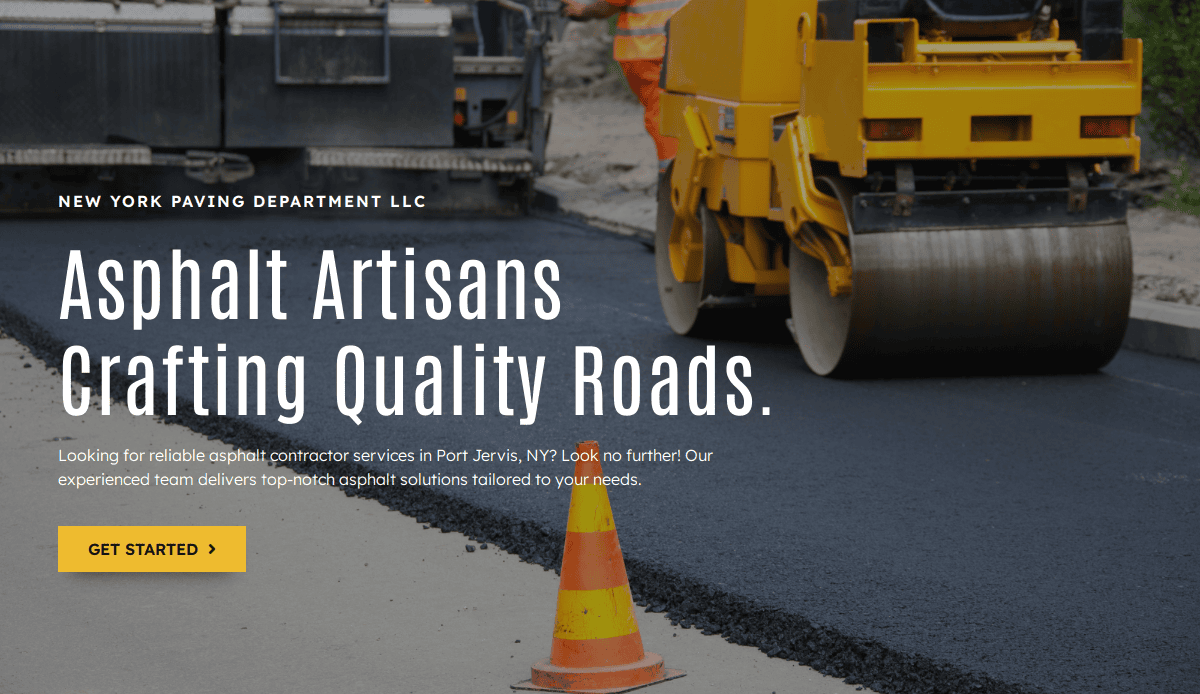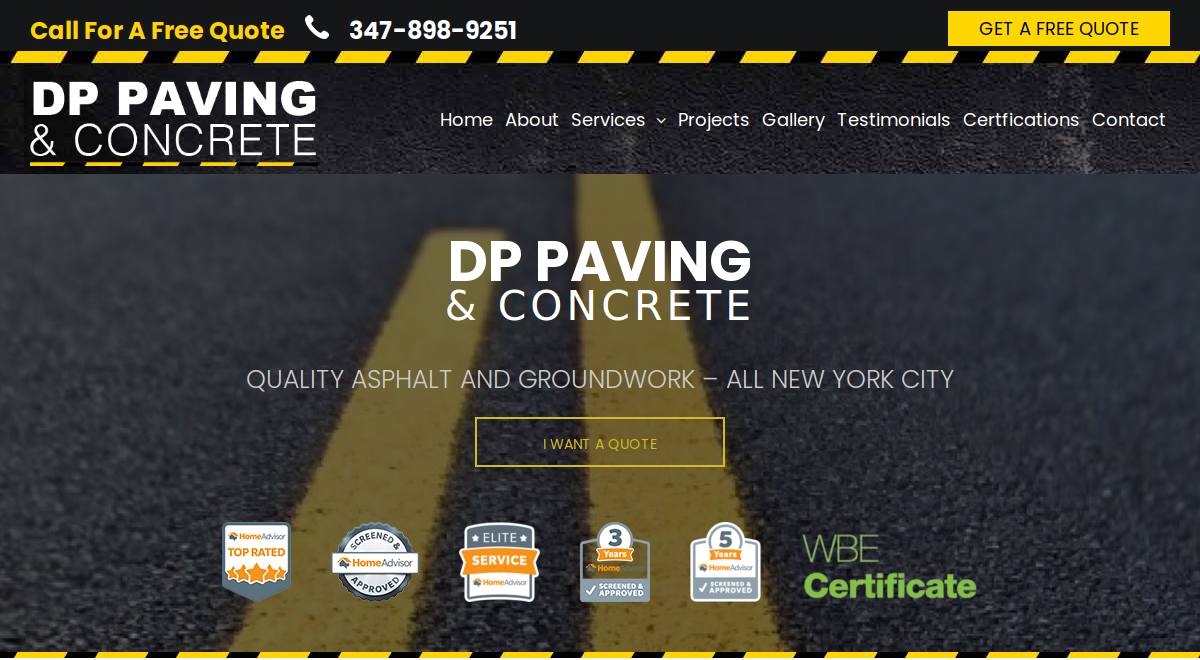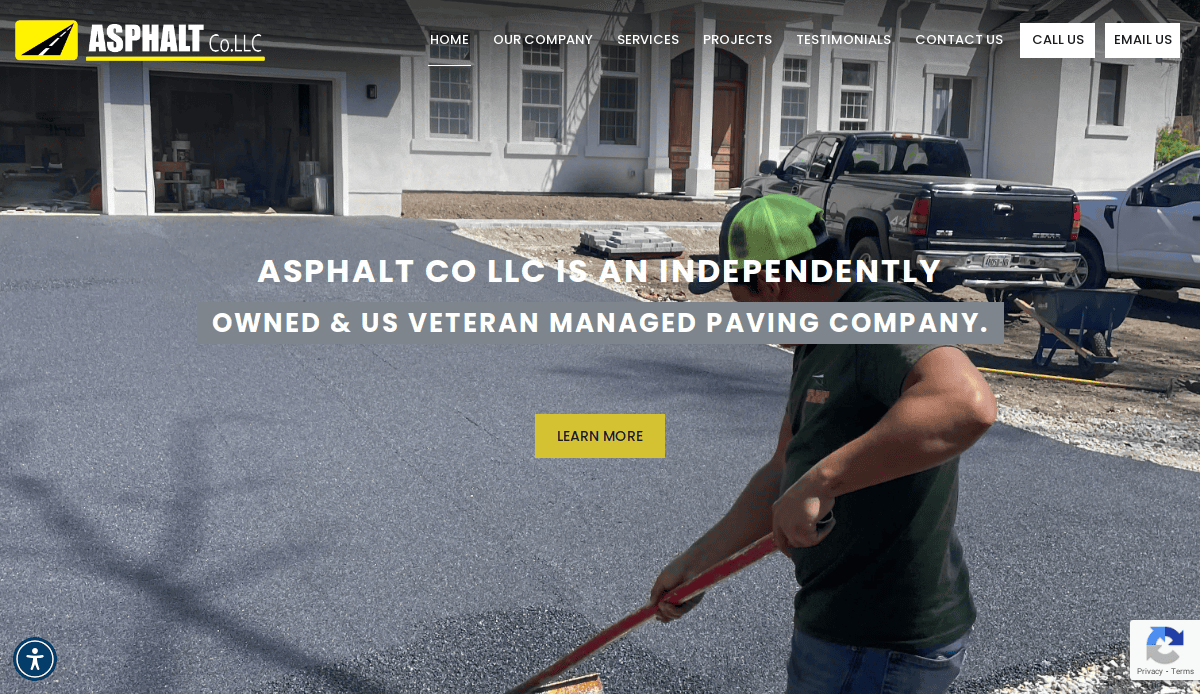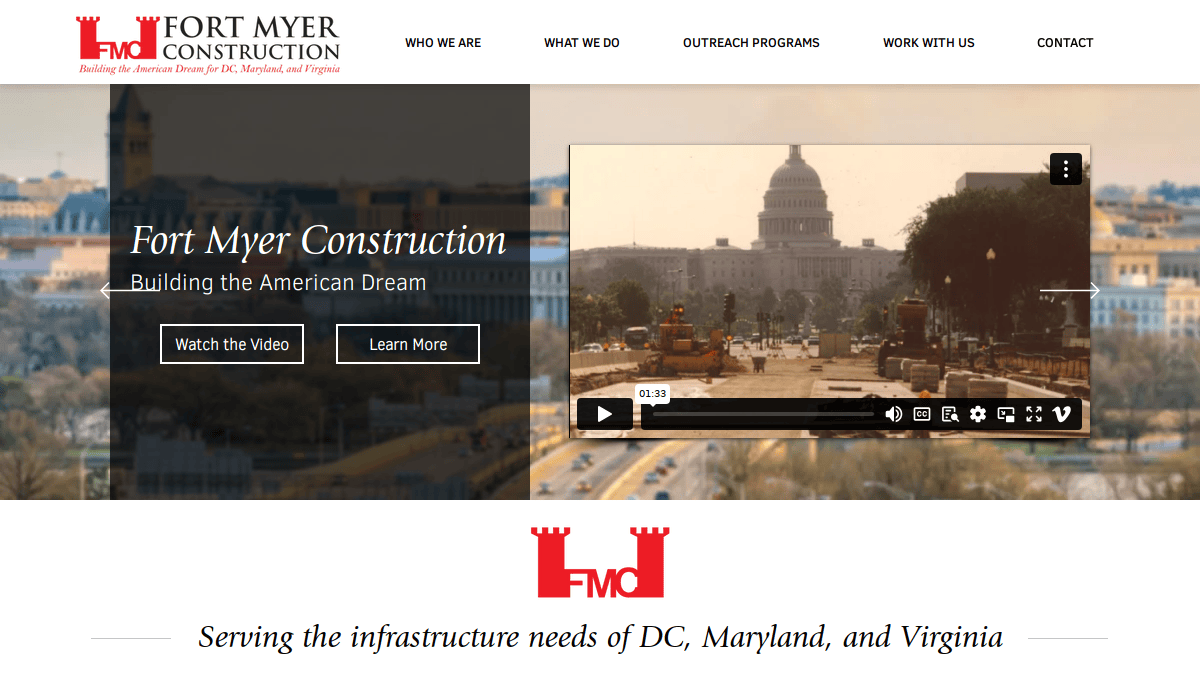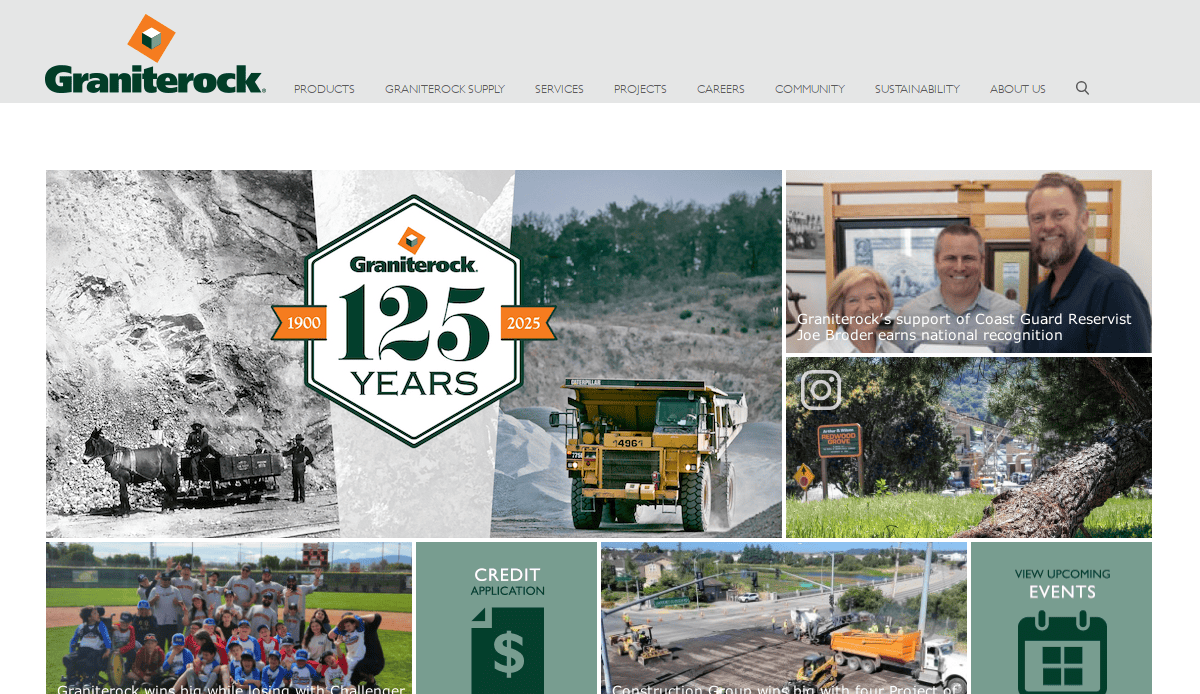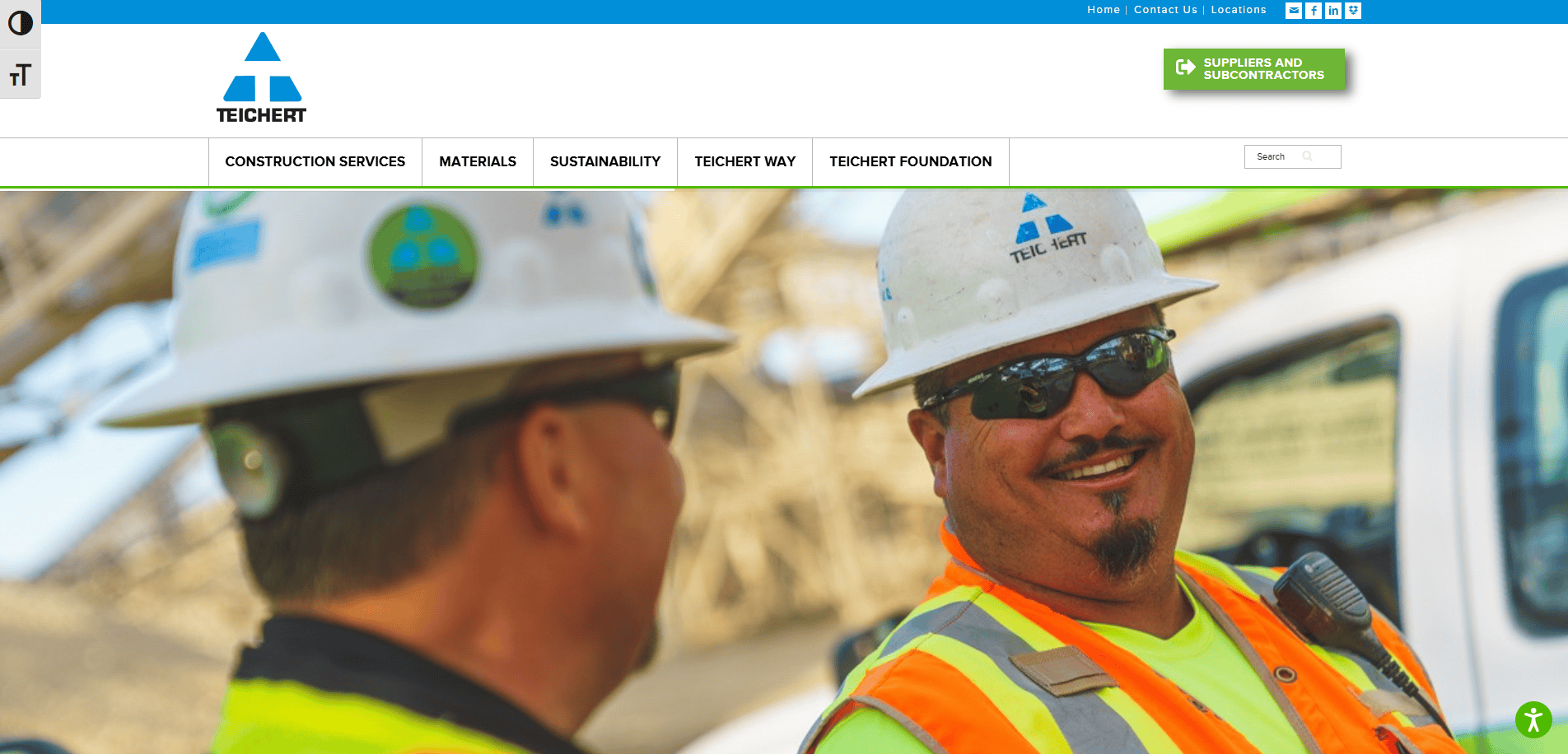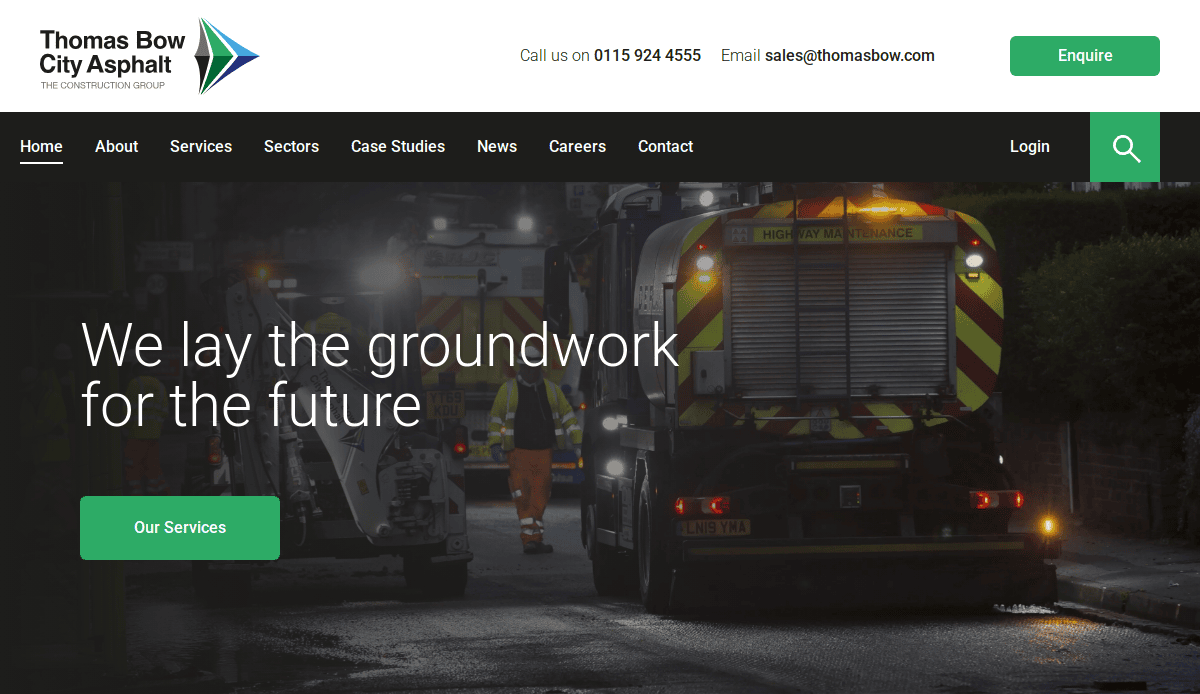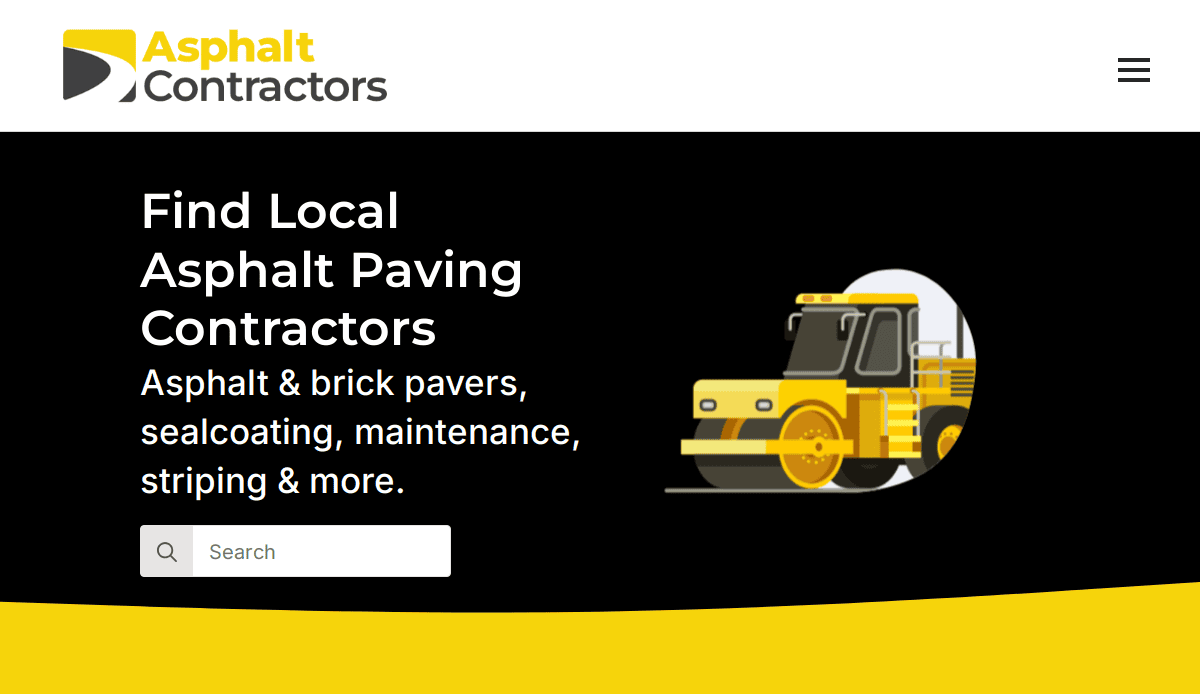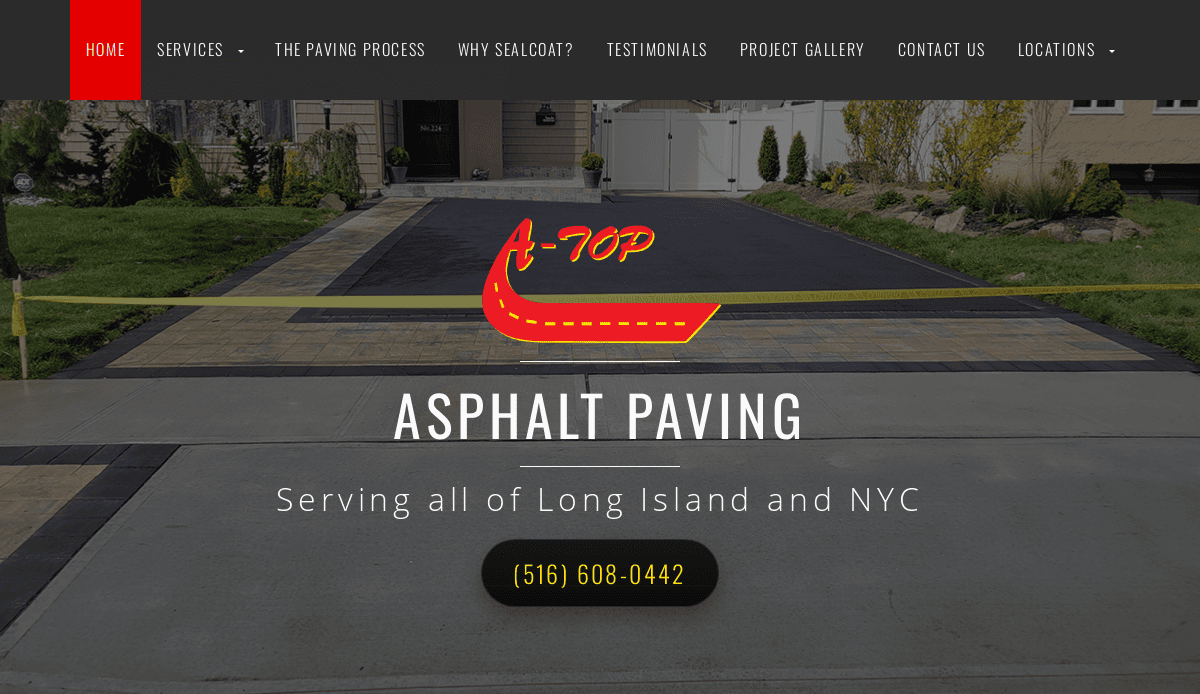Just looking for our Best Asphalt Sealcoating Website examples list?
Key Takeaways:
- Prioritize Local SEO from the Start: Industry-specific contractors benefit most from hyper-local visibility. Incorporate service area pages, Google Business Profile optimization, and geo-targeted keywords like “asphalt paving in [City]” to consistently appear in search results for nearby customers. Embedding a map of your service area and using local imagery adds trust and relevance.
- Design for Mobile-First and Fast Load Speed: Over 60% of visitors will access your site from mobile devices. A mobile-friendly design paired with optimized loading speeds directly reduces bounce rates and improves both user satisfaction and overall ranking. Use compressed images, streamlined navigation, and an adaptive layout to keep visitors engaged and converting.
- Showcase Visual Proof of Work: Invest in a professional portfolio section featuring interactive galleries, project filters, and before-and-after visuals. High-impact imagery builds trust and lets potential clients evaluate your craftsmanship, while also boosting your site’s dwell time—an important visitor behavior signal for SEO.
Why Contractors Can’t Afford an Ineffective Site Design
When someone searches for “asphalt paving near me,” what do they find—your business or your competitor’s? A high-performing paving website isn’t just a “nice to have”—it’s a core business asset. Your site is the first impression most prospects will have of your brand. If it’s outdated, confusing, or slow to load, potential customers won’t stick around long enough to see what sets you apart.
Effective site design goes beyond looks. An SEO-optimized layout ensures your company ranks higher in local search results and performs well on mobile devices, where most of your leads are browsing. Strong calls to action, intuitive navigation, and real-time website metrics can guide you in understanding visitor behavior and refining your digital strategy over time.
In a competitive industry like this one, the companies that win online are those that invest in user-friendly websites designed to convert. Whether you’re trying to attract homeowners or commercial clients, the right site design can directly improve lead quality, booking rates, and ultimately, your bottom line.
Laying the Foundation: Website Planning & Purpose for Asphalt Contractors
Before laying a single line of code or choosing a color palette, every successful website starts with a clear plan. Just as you wouldn’t pave a road without surveying the land, a well-thought-out website begins with understanding your business goals, customer needs, and the digital landscape you’re competing in.
For paving professionals, this planning phase isn’t just about aesthetics—it’s about building a digital presence that attracts leads, educates prospects, and streamlines the sales process. You need to define what actions you want visitors to take, such as requesting a quote, calling your office, or browsing your completed projects. That clarity shapes everything from the site’s structure to the tone of your copy.
Equally important is identifying your primary audience. Are you focused on residential driveway resurfacing or large-scale commercial pavement projects? Each audience has different expectations, pain points, and decision timelines. A residential homeowner may need to be guided through the basics of asphalt paving, while a commercial property manager is likely looking for proof of experience and insurance credentials. Planning your site with these user journeys in mind ensures a smoother experience and more conversions.
Finally, think long-term. A strong paving website is more than a digital brochure—it’s a lead generation engine. That means incorporating clear service area details, keyword strategy, calls to action, and fast-loading, adaptive design from the start. If you’re looking for inspiration or a deeper dive into what works, explore our breakdown of 15 proven web design strategies for construction companies. Many of these principles are directly transferable to asphalt and paving contractors looking to improve their digital performance.
Thoughtful planning at this stage sets your website up for measurable business results, helping you pave the way to more visibility, better leads, and sustained growth.
Design Principles That Drive Results for Professional Websites
Great site design isn’t just about visuals—it’s about function. The best websites are built around clear goals: establish credibility, showcase past work, and convert visitors into paying clients. Whether you’re targeting residential homeowners or large-scale commercial projects, a few core design principles will determine whether your site delivers results or drives prospects away.
- Simplicity and Clarity
Busy designs with too many animations or clashing colors can overwhelm users and dilute your message. A clean, streamlined layout with a clear hierarchy helps visitors focus on what matters: your services, your expertise, and how to contact you. Avoid clutter, and prioritize essential information above the fold, such as a compelling headline, brief service summary, and a call-to-action like “Request a Quote.” - Visual Trust Signals
Paving is a high-stakes purchase, whether it’s for a new commercial parking lot or a residential driveway. People want to know they’re hiring a professional. Include badges for certifications, insurance, associations like NAPA, and customer reviews. High-quality photos of recent work are even more powerful. Showcase before-and-after images and use captions to explain the scope of each project. - Responsive Design for All Devices
Over half of all website traffic now comes from mobile devices. If your site isn’t mobile-friendly, you’re losing leads. An adaptive design adapts seamlessly to phones, tablets, and desktops. That means clickable phone numbers, easy navigation, and fast loading on all devices—a must for any paving company aiming to reach customers on the go. - Clear Navigation Structure
An intuitive site structure makes it easy for visitors to find what they’re looking for. Use a top menu with clearly labeled categories like Services, Portfolio, About Us, and Contact. Drop-down menus should be minimal and purposeful. Each page should link logically to the next step in the customer journey, whether that’s learning more about your services or filling out a quote request. - Effective Use of Color and Contrast
Color choices should reflect your brand while also aiding readability and user flow. Many company websites use bold, contrasting colors like yellow, orange, or black to mirror the materials used in the field, but these must be balanced for accessibility. Buttons and CTAs should stand out, using contrast to draw attention and guide users naturally through the site. - Calls to Action that Stand Out
Every page should include a clear call to action—preferably above the fold and at the bottom. Whether it’s “Schedule an Estimate” or “See Our Work,” buttons should be visually distinct and use actionable language. These CTAs help guide the user journey and improve conversion rates without being pushy. - Performance-Driven Layouts
User behavior tools and data insights can show which parts of your site drive the most engagement. Design around these behaviors by placing key content, CTAs, and trust signals where users spend the most time. For example, placing a testimonial slider or featured project near your services section can reinforce confidence right before a visitor makes a decision.
In this industry, a well-designed website isn’t just your digital business card—it’s your most powerful sales tool. By applying these design principles from the start, asphalt contractors can build websites that look professional and drive measurable business outcomes.
Content & Navigation: Structuring for Clarity, Engagement, and Conversions
When it comes to professional websites, strong content and intuitive navigation are essential to turning visitors into customers. A user landing on your site shouldn’t have to guess what services you offer, where you operate, or how to contact you. Clear structure and strategically placed content make it easy for prospects to find the answers they need—and take the next step with your business.
Start with a Logical Page Hierarchy
Every successful website begins with a well-defined architecture. The core structure should include:
- Home: Quick overview of services, unique value proposition, and calls to action.
- About Us: Your team, experience, certifications, and service philosophy.
- Services: Individual pages for each offering—residential paving, commercial paving, sealcoating, repair work—optimized with relevant local SEO terms.
- Portfolio: Project highlights with images, brief descriptions, and location details.
- Service Areas: Pages targeting cities or regions you serve, designed to boost local SEO rankings.
- Contact: Simple, mobile-friendly contact forms, clickable phone numbers, and a map.
Each of these pages should follow a consistent layout and visual structure to help users quickly understand what they’re seeing—and what to do next.
Prioritize the User Journey
Think of your website as a guided experience. What does a first-time visitor want to know first? What proof do they need to trust you? What action do they need to take next? Build content that walks them through this journey, using clear headlines, bullet points, and calls to action at every step. Testimonials, before-and-after photos, and project stats should be used contextually to reinforce credibility right before the visitor decides to reach out.
Use Navigation That Makes Sense
Your top navigation bar should be clear, concise, and limited to 5–7 primary links. Avoid generic labels like “Info” or “Stuff We Do.” Use direct terms like “Asphalt Services” or “Get a Quote.” Sticky headers—where the menu remains visible as users scroll—are a great feature for long pages. Also, make sure your footer includes contact details, trust signals (like association logos), and links to key pages for SEO benefits.
Content Should Educate, Not Just Sell
Today’s buyer is research-driven. Your website content should help users understand what differentiates service methods, how long a typical project takes, or how to maintain a freshly paved surface. Educational blog posts and FAQs build authority and keep visitors on your site longer, which positively impacts your rankings and trust. For more insights into structuring content that converts, review our contracting website conversion tips.
Local SEO and Keyword Strategy
Don’t overlook the power of on-page SEO. Use localized keyword phrases throughout your content, like “asphalt driveway paving in Naperville” or “parking lot resurfacing in Milwaukee.” Incorporate these naturally in headers, body text, alt tags, and meta descriptions to ensure search engines and users understand what you offer and where.
Well-structured content paired with intuitive navigation improves user experience, boosts search visibility, and drives more qualified leads to your business. When visitors can quickly find what they need and feel confident in your expertise, they’re far more likely to convert.
Visual Elements: Creating a Strong First Impression and Supporting Brand Trust
In this industry, visuals do more than make a website attractive—they prove the quality of your work. A polished, professional design with strong visual elements builds trust, enhances user experience, and reinforces your brand identity from the moment a visitor lands on your site.
Use Real Project Photos, Not Stock Images
Authenticity matters. Visitors want to see your actual work, not generic paving scenes. Invest in high-resolution photography of completed projects, both residential and commercial. Include wide shots that show full driveways or lots, as well as close-ups that demonstrate attention to detail. Before-and-after galleries are especially effective, helping visitors visualize your capabilities and results.
Incorporate Consistent Branding
Your website’s color scheme, typography, and iconography should reflect your company’s identity. Many professional contractors use black, yellow, or gray color palettes to align with pavement visuals, but consistency is key. This visual branding should match your trucks, signage, uniforms, and business cards to present a unified and professional image.
Add Visual Cues for Calls to Action
Your site’s visual layout should guide users naturally toward action. Use contrasting button colors for calls to action like “Request a Quote” or “Schedule an Estimate.” Icons can help illustrate service categories, and directional cues (such as arrows or layout patterns) can lead users from one section to the next. These subtle visual elements increase engagement without overwhelming the user.
Make Navigation Visually Intuitive
Design your layout to accommodate fast scanning. Use headings, subheadings, and section dividers to break up text. Implement sticky navigation and keep menus clean. For mobile users, collapsible menus and click-to-call buttons ensure a seamless experience across all devices. These visual elements support accessibility and improve overall usability.
Showcase Visual Testimonials and Trust Signals
Integrate photos of your team or happy customers alongside written testimonials to create a human connection. Display trust badges like BBB ratings, insurance proof, or industry affiliations near these testimonials to reinforce credibility. These visual cues help answer the subconscious question every user has: “Can I trust this company to do the job right?”
Video Adds Depth and Engagement
Short videos—such as time-lapse footage of a paving job or a quick “day in the life” of your crew—bring your process to life. Videos increase the time visitors spend on your site, which positively impacts optimization. They’re also more memorable and easier to digest than long text explanations.
Visuals aren’t decorative—they’re functional. They enhance the user’s understanding of your services, validate your quality, and support every decision a visitor makes on your site. A strong visual strategy turns casual browsers into confident leads.
Best Asphalt Company Website Examples
Here are 18 standout industry websites, including four designed by our agency, each exemplifying excellence in design, functionality, and user experience.
1. Pro Sealed Asphalt Inc.
Location: Chicago, IL
Key Takeaways:
- Clean layout with intuitive navigation.
- Prominent call-to-action for free estimates.
- High-quality images showcasing completed projects.
2. P&M Paving
Location: Dallas, TX
Key Takeaways:
- Comprehensive service descriptions.
- Engaging visuals of past projects.
- Customer testimonials enhance credibility.
3. Rainier Asphalt & Concrete
Location: Seattle, WA
Key Takeaways:
- Extensive overview of services.
- Well-organized layout with clear navigation.
- Customer testimonials provide authenticity.
4. Driveway Contractor LLC
Location: Columbus, OH
Key Takeaways:
- User-friendly interface with clear service listings.
- High-quality images of completed projects.
- Easy access to contact information.
5. Empire Paving
Location: Cleveland, OH
Key Takeaways:
- Comprehensive service descriptions.
- Emphasis on extensive experience and quality commitment.
- Easy navigation with direct contact options.
6. CPAC Asphalt Paving
Location: Memphis, TN
Key Takeaways:
- Detailed sections on various services.
- User-friendly with straightforward request forms.
- Highlights commitment to technology and ecological practices
7. Copper State Pavement
Location: Phoenix, AZ
Key Takeaways:
- Dynamic and professionally designed platform.
- Easy-to-navigate layout detailing services.
- High-quality visuals enhance user engagement.
8. NY Asphalt
Location: New York, NY
Key Takeaways:
- Specializes in various heavy construction work.
- Comprehensive service listings.
- Professional and straightforward design.
9. Thomann Asphalt
Location: Lancaster, NY
Key Takeaways:
- Full-service paving company with a rich history.
- Showcases a range of services and industries served.
- Highlights featured projects and the company’s story.
10. New York Paving Department LLC
Location: Port Jervis, NY
Key Takeaways:
- Emphasizes quality and durability in services.
- Detailed service descriptions with clear CTAs.
- Professional visuals and customer-centric content.
11 DP Paving & Concrete
Location: Queens, NY
Key Takeaways:
- Family-owned with extensive experience.
- Comprehensive list of services, including ADA compliance.
- Prompt project completion emphasized.
12. Asphalt Co LLC
Location: Denver, CO
Key Takeaways:
- Veteran-managed with a strong work ethic.
- Extensive paving experience spanning three generations.
- Client satisfaction is prioritized.
13. Fort Myer Construction
Location: Washington, DC
Key Takeaways:
- Largest asphalt supplier and road paving company in DC.
- Extensive experience with government contracts.
- Emphasis on quality control and community support.
14. Graniterock
Location: Watsonville, CA
Key Takeaways:
- Over a century of experience in construction materials.
- Offers a wide range of products and services.
- Commitment to sustainability and innovation.
15. Teichert
Location: Sacramento, CA
Key Takeaways:
- Established in 1887 with a rich history.
- Diverse mix of construction services and materials.
- Strong community involvement through the Teichert Foundation.
16. Thomas Bow City Asphalt
Location: Nottingham, UK
Key Takeaways:
- Privately owned with a long-standing history.
- Specializes in civil engineering and groundwork.
- Recognized for excellence in the industry.
17. Asphalt Contractors Directory
Location: Nationwide
Key Takeaways:
- Comprehensive directory of asphalt contractors.
- Easy-to-use search options for various services.
- Detailed contractor profiles for informed decisions.
18. A-TOP Asphalt Paving
Location: Long Island, NY
Key Takeaways:
- Offers a wide range of paving services to both residential and commercial clients throughout Nassau County and surrounding regions.
- Emphasizes quick and efficient services, ensuring exceptional and on-time results.
- Family-owned and operated with over 20 years of experience, highlighting professionalism and dedication.
Ready to Build an Asphalt Contractor Website That Performs?
If your current site isn’t generating the kind of leads you expect—or worse, if you don’t have one—it’s time to stop settling. In today’s digital age, your website is the face of your asphalt paving business. A well-designed, optimized, and conversion-focused site is one of the most effective tools you have to improve online visibility and attract new customers. From showcasing your work to guiding visitors through your paving services, your company’s website should reflect your expertise in asphalt and support your long-term business goals.
Whether you’re looking to create a website from scratch or upgrade an outdated company website, our professional web designers and developers can help you build a strong online presence that actually delivers results. Our team specializes in web design for paving contractors, combining search engine optimization, responsive design, and digital marketing strategy into one seamless solution that’s built to convert.
Let’s talk about creating an effective asphalt paving website for your business— schedule a free consultation with us today.
Frequently Asked Questions: Asphalt Contractor Website Design
1. What should an asphalt paving company include on its website?
An effective paving company website should feature service pages for residential and commercial paving services, a gallery showcasing past projects, customer testimonials, and a clearly labeled contact or quote request form. To increase your online visibility, integrate relevant keywords and optimize each landing page with a responsive design and local SEO best practices.
2. How can I ensure my website reaches the right target audience?
Start by defining your ideal customer—whether it’s residential homeowners, commercial property managers, or municipalities—and structure your content to speak directly to their needs. Use keywords related to your core services and service areas. A strong landing page for each region or service type will also help your asphalt company rank better and resonate with your audience.
3. Why does page speed and responsiveness matter for asphalt pavement websites?
A website that is adaptive and loads quickly on all devices ensures a smooth user experience, which reduces bounce rates and boosts conversions. Fast, mobile-optimized pages are also favored by search engines, helping your site rank higher and outperform competitors in this industry.
4. What are some key optimization elements for a professional website?
To optimize your website, focus on:
- Keyword-rich service and location pages
- Meta titles and descriptions with relevant keywords
- Internal linking to blog content and service pages
- Structured headings and clean URLs
- Integration with engagement data tools to analyze user engagement and identify areas for improvement
5. How can a custom design improve my asphalt company’s website performance?
A custom design aligned with your brand creates a more trustworthy and professional appearance. It allows for tailored layouts, including elements such as images of your work, certifications, and pavement solutions. A well-thought-out page template improves navigation and showcases your expertise in asphalt effectively, ultimately supporting a website that drives leads.
6. What kind of blog content helps asphalt contractor businesses?
Educational blog posts that provide maintenance tips, explain asphalt repair options, or break down the differences between residential and commercial asphalt services can establish authority and build trust. Consider writing a step-by-step guide or an ultimate how-to guide to support SEO and increase engagement.
7. Should I use Google Analytics on my website?
Yes. It helps you analyze user behavior, track traffic sources, measure conversion rates, and identify pages that need improvement. When combined with tools like Google Search Console, you’ll gain deeper insights into how well your website is performing and how to refine your strategy.
8. Can I easily create landing pages for promotions or seasonal services?
Absolutely. A flexible content management system like WordPress allows you to create landing pages quickly using pre-built or custom page templates. This is especially useful for promoting limited-time services like seasonal pavement maintenance or discounts on commercial asphalt packages.
9. What sets the best industry websites apart?
The best industry websites combine user-focused design, strong calls to action, mobile responsiveness, SEO-rich content, and visual proof of work. A web designer who understands the marketing industry and your local market can help craft a site that performs and converts.
10. How often should I update my website?
Regular updates ensure your website remains current and competitive. Refresh service pages, upload new project photos, update blog posts with new statistics, and monitor traffic trends using tools like Google Analytics. Keeping your content and design services up to date will help maintain authority and search visibility.
By addressing these key questions, your asphalt company can establish a strong online foundation that informs your audience and turns visitors into long-term clients.

